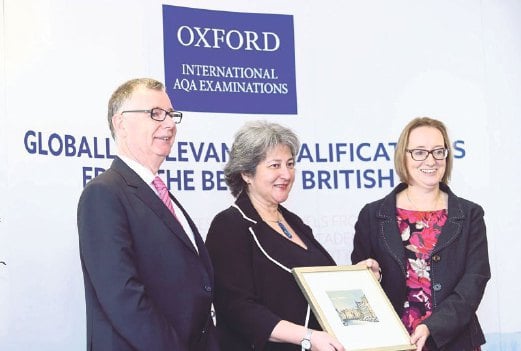UNIQUE: The Oxford AQA exams aims to provide English-medium qualifications and preparation for studying in the UK
An international qualification examination offers an opportunity for students to further their studies at institutions of higher learning all over the world. Those seeking to study in universities in the UK especially, would do well to take up qualifications such as the ones offered by Oxford AQA Exams.
Recently launched in Malaysia for the Southeast Asia market, the Oxford AQA Exams offer a range of international qualifications that includes international GCSEs, AS and A-levels to students outside the UK. It was a move aimed at raising educational standards in Southeast Asia by providing high quality English-medium qualifications for the growing number of students attending schools teaching a British curriculum, or schools that are preparing students for studies in the UK.
A joint venture between Oxford University Press, a department of the University of Oxford, and AQA, a leading academic awarding body in the UK, AQA Chief Executive Andrew Hall said: “Our qualifications will really help young people in Southeast Asia to develop the skills they need to thrive in the world’s knowledge-based economies.”
At its launch in Kuala Lumpur recently, it was announced that students from Malaysia and other Southeast Asian countries can sit for English, maths and science international GCSE qualifications. Additionally, there are qualifications in the areas of business, computer science, geography and psychology.
What makes Oxford AQA Exams stand out from other qualification awarding bodies is the inclusion of a unique research-based qualification, known as Individual Project Qualification (IPQ), that gives students an opportunity to extend their abilities beyond the A-level syllabus, stand out and prepare for university or their future career.
“Oxford AQA Exams is at the forefront of educational research. Our qualifications are based upon over 100 years of experience, academic research and international best practices,” added Hall.
Oxford AQA Exams has adopted the new 9-1 GCSE grading that will be implemented in England from 2017, replacing the existing A* - G grades. The new numerical grading system provides greater differentiation in the middle and at the top with the use of an extra grade. For example, a grade 5 will be positioned in the top third of the marks for a current grade C and the bottom third of the marks for a current grade B. Under the new system, a grade 5 will be considered a “good pass”. This grading system ensures that qualifications are aligned to the latest reforms to raise standards in the UK, while maintaining its relevance for international students, making Oxford AQA Exams a leading academic awarding body.
The qualification specifications, tailored to the needs of students staying outside the UK, rigorously prepares students for the next stage of academia in the maths qualification, without disadvantaging students who are unfamiliar with British contexts. Candidates are tested using straightforward language to ensure they succeed based on their maths ability and not their literacy skills. Simple language and consistent phrasing is the key to ensuring this.
For science, the specifications have been adapted so that schools outside the UK can make practicals an integral part of their teaching. For example, where chemicals are required for a practical, they are clearly labelled so that schools can order well in advance. Flexibility is also given where possible so that available apparatus and practical materials can be used to meet the practical objectives. Also, where examples are given, they reflect the availability of practical materials outside the UK.
Oxford AQA Exams pride themselves with the fact that their assessments reflect their integrated approach to teaching practicals, whereby the exam papers test both practical skills and theoretical knowledge — so there is no separate practical exam paper. The use of consistent command words in the assessment also ensures students are clear in what they are being asked to do.
Oxford AQA Exams English Language qualifications give an opportunity for students to explore spoken texts, as well as letting them study theoretical and conceptual issues in the spoken language. Students are exposed to a wide range of forms, sources and texts as a basis for study, and focus on variation and globalisation in language acquisition and development.
UK NARIC, the agency responsible for providing information, advice and opinion on academic qualifications from all over the world, has recognised Oxford AQA Exams qualifications as being comparable to UK qualifications. The qualifications are also accredited by the UK examinations regulator, Ofqual.
According to Hall, there are already a number of schools in Malaysia taking Oxford AQA qualifications, so they wanted to give the right support and services. “Further, Oxford University Press and AQA have a shared mission to improve education through teaching, learning and assessment,” he said.
Apart from the IPQ, Oxford AQA Exams is also unique in that they provide a wide range of resources for teachers who teach IGCSE qualifications, with on-the-ground support. Up to 12 different types of free teaching resources are provided to accompany the specifications given. These include Schemes of Work, Specimen Assessment Resources with Mark Schemes and exam preparation tools such as Exampro and Enhanced Results Analysis. Teachers will also be provided with Teacher Guideline Documents and Classroom Activity Sheets and Slides. A bank of examination questions as well as test analysis are available as resources, too.
On-the-ground support for the teachers is quite extensive too, being made up of training sessions such as face-to-face and online Taster sessions for heads of departments and classrooms teachers that will provide an overview of the specifications for the qualifications, allowing schools and teachers to make informed decisions around their curriculum choice for the following year.
Also in store are face-to-face and online Prepare to Teach training workshops to help teachers orient themselves with the specifications in preparation for teaching. Throughout the year too, webinars are conducted, giving opportunities for networking and for teachers to receive expert advice from the regional consultants and specialists.
The extensive support and service are made available to schools and teachers when they sign up to become an Oxford AQA Exams school. For more information, visit oxfordaqaexams.org.uk/become-an-oxford-aqa-school.





